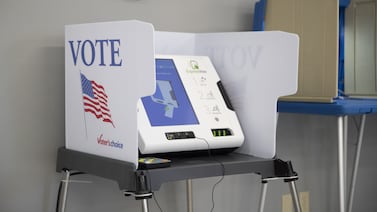Votebeat is a nonprofit news organization reporting on voting access and election administration across the U.S. Sign up for Votebeat Texas’ free newsletter here.
What happened?
A federal judge struck down Texas’ requirements for ID numbers on mail ballot applications, ruling that they are unconstitutional and discriminate against voters with disabilities.
The law required voters to write their driver’s license number, personal identification number, or the last four digits of their Social Security number — whichever number they originally used to register — on their mail ballot application and mail ballot envelope. But voters didn’t always remember which number they had used, and if they failed to include one, or included one that wasn’t on file, their ballots were rejected.
Texas restricts mail-in voting largely to voters with disabilities and elderly voters.
U.S. District Judge Xavier Rodriguez said the requirements will remain in effect through municipal elections scheduled for May 3, because it’s too close to the election to change the process.
What’s the dispute?
The decision is the latest ruling in the consolidated challenge to SB1, the sweeping overhaul of election laws that Texas lawmakers passed in 2021. Rodriguez previously found that certain provisions restricting voter assistance violated the federal Voting Rights Act and could not be enforced. The judge had also struck down a provision that required election officials to reject mail-in ballot applications and ballots that did not include the identification numbers. That ruling is being appealed.
Who are the plaintiffs?
A coalition of plaintiffs, including voting rights groups such as the Southwest Voter Registration Education Project, have challenged multiple provisions of the law, and the case is ongoing. The plaintiffs argue that various provisions of the sweeping law have made it harder for voters of historically marginalized communities to cast ballots, with some alleging the effect was intentional.
What are they asking for?
The plaintiffs want the courts to rule that the law is unconstitutional. In addition, they’re seeking an injunction that would prohibit the state from further enforcing the challenged provisions of the law.
What happens now?
The state is expected to appeal. Rodriguez’s previous rulings in the case are currently under appeal in the 5th U.S. Circuit Court of Appeals.
Read more Votebeat coverage of challenges to SB1:
- Voters of color had mail ballots rejected at higher rates in Texas’s March primary, study finds
- Federal judge strikes down more rules from Texas’ SB1 election law
- Texas trial over sweeping voting law to discuss voter ID and restrictions to absentee ballot delivery
Natalia Contreras covers election administration and voting access for Votebeat in partnership with the Texas Tribune. She is based in Corpus Christi. Contact Natalia at ncontreras@votebeat.org






